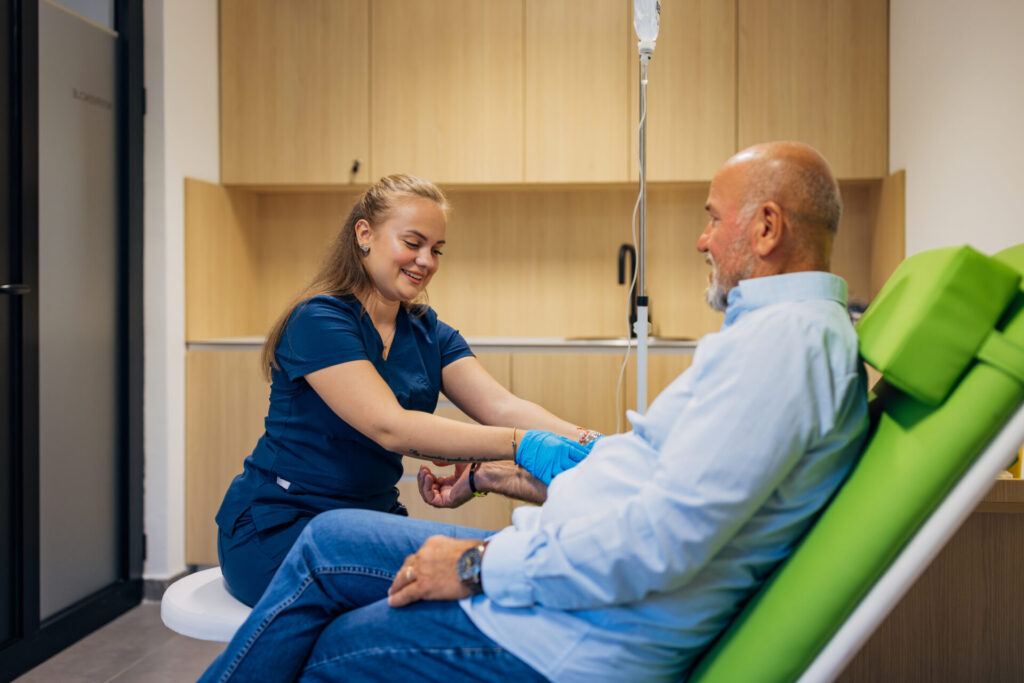Checkpoint inhibitors have been a game changer for advanced nonmelanoma skin cancers, but other groundbreaking treatments are emerging as well. Photo credit: Kosamtu/Getty Images
If you’re looking for some good news, you can find it in the fight against advanced skin cancers. While melanoma research led the way, reducing a likely death sentence to an often-curable disease, options for patients with advanced squamous cell carcinoma (SCC) and basal cell carcinoma (BCC) have expanded, too.
When medical journalists write about the ongoing revolution in treatments for advanced skin cancer, we tend to focus on melanoma — the deadliest common form of the disease. However, recent years have also seen brisk progress in the fight against other types of skin cancer, such as squamous cell carcinomas (SCCs) and basal cell carcinomas (BCCs).
The first such drug, ipilimumab, was approved for melanoma in 2011. Ipilimumab accomplished something no previous medication had done: It significantly expanded median survival rates in patients with advanced melanoma, many for a decade or more. The drug’s side effects, though sometimes serious, were generally tolerable. And as two more checkpoint inhibitors were approved for the disease, pembrolizumab and nivolumab, the numbers continued to improve.
The advent of checkpoint inhibitors has also been a game changer for advanced nonmelanoma skin cancers. But in the past decade, other groundbreaking treatments have emerged as well — some of them still experimental. Here’s a roundup of those innovations.
Squamous Cell Carcinoma
When diagnosed early, most SCCs, the second most common type of skin cancer, can be successfully treated with surgery alone, sometimes supplemented by radiation. These cancers are somewhat more likely than BCCs to spread, however, and they can be disfiguring or life-threatening when they do.
Cemiplimab, the first checkpoint inhibitor for metastatic or locally advanced cutaneous SCC, was approved by the FDA in 2018. Pembrolizumab, originally approved for melanoma, was added to the advanced SCC arsenal in 2020. And in December 2024, the FDA approved another new checkpoint inhibitor for advanced SCC, cosibelimab-ipdl.
All three of these drugs target the same molecular pathway, known as PD-1/PD-L1, but each takes a slightly different approach — one that may be optimal for different individuals or at different stages of treatment. In patients with advanced disease, response rates range from 34 to 50 percent.
New Approaches under investigation for SCC include:
- Other checkpoint inhibitors, alone or in combination.
- Checkpoint inhibitors combined with other approaches, such as targeted drugs or oncolytic immunotherapy, in which genetically modified viruses are used to attack tumor cells.
- Neoadjuvant or adjuvant therapy, using cemiplimab before or immediately after surgery to prevent recurrence in high-risk cases.
- Experimental radiation therapy, using alpha-particle technology (see box).
Basal Cell Carcinoma
BCC, the most common type of skin cancer, is usually localized and curable by surgery, radiation therapy or topical medications. But in the rare instances when it does spread, it can be lethal. Two targeted therapies, vismodegib (approved in 2012) and sonidegib (approved in 2015), known as hedgehog pathway inhibitors (or HHIs), had been in use for some patients with advanced BCCs. Then cemiplimab was also approved for patients with advanced BCC in 2021. The latter drug can slow or stop disease progression for about one-third of those with locally advanced disease, and 20 percent with widespread metastases.
New Approaches under investigation for BCC include:
- Other checkpoint inhibitors, alone or in combination.
- Therapeutic vaccines that target the PD-1/PD-L1 pathway in T cells, which BCC tumors use to disable immune response in some patients.
Merkel Cell Carcinoma
A rare type of skin cancer with about 3,000 new cases in the U.S. each year, Merkel cell carcinoma (MCC), is even deadlier than melanoma. First-line treatment for MCC usually includes excision of the primary tumor, followed by radiation therapy, but recurrence is very common.
Patients with locally advanced or metastatic disease once had no effective options; now they may receive one of three approved checkpoint inhibitors, including avelumab (approved in 2017), pembrolizumab (approved for MCC in 2018) and retifanlimab (approved in 2023). But while over half of these individuals respond to some degree, only a minority achieve complete remission.
New Approaches Under Investigation for MCC include:
- Other checkpoint inhibitors, alone or in combination.
- Targeted drugs that block the mutated MDM2 gene, crucial to tumor growth in MCC.
- Therapeutic vaccines that target proteins related to the Merkel cell polyomavirus, which causes about 80 percent cases of MCC. (About 20 percent are caused by ultraviolet radiation.)
- Autologous transgenic T cells, immune cells genetically programmed to attack a specific cancer.
- Oncolytic immunotherapy, in which genetically modified viruses are used to attack tumor cells.
- Peptide receptor radionuclide therapy, in which a pharmaceutical agent delivers a radioactive chemical to kill cancer cells.
- Somatostatin analogs, synthetic hormones that can impede tumor growth.
- Tyrosine kinase inhibitors, another type of drug that slows the spread of tumors.
A Different Kind of Radiation Technology
Although radiation therapy (RT) can be a useful tool for treating skin cancer, surgery is usually the preferred first-line treatment. That’s because the types of RT used for most cancers carry several downsides. Unlike surgical treatments, they typically require many sessions over weeks or months. They may not be able to remove a tumor completely. And the powerful radiation they use — X-rays or high-energy protons, emitted by an external source — doesn’t just kill cancer cells; it can harm healthy tissue, causing burns, sores, hair loss and other damage.
A new technology called Alpha DaRT (short for Diffusing Alpha-Emitters Radiation Therapy), aims to avoid those shortcomings. It uses ultra-thin needles to insert tiny “seeds” coated with radioactive material into a tumor. Placed in precise arrays, the seeds emit alpha radiation, whose wavelength is too short to penetrate a sheet of paper. “They destroy only the cancer cells around them, with the potential for high efficacy and low toxicity,” explains Zachary Buchwald, MD, PhD, a radiation oncologist at Emory University. Treatment is completed in one session, and the seeds are removed after a few days.
In preliminary trials for head and neck cancer, Alpha DaRT achieved a 100 percent response rate, with 78 percent complete responses. Those results earned the therapy a Breakthrough Device designation from the FDA.
Now, Dr. Buchwald is helping to lead two multi-center trials of Alpha DaRT for recurrent cutaneous SCC. In the first, participants with normal immune systems who haven’t benefited from standard therapies will undergo the treatment. The second trial will be for immunodeficient patients, whose treatment options have long been limited.
A compromised immune system — due to factors such as anti-rejection drugs for organ transplants, chronic lymphocytic leukemia or HIV — is a major risk factor for skin cancer. Yet it also makes these patients ineligible for immunotherapies such as checkpoint inhibitors. “We hope AlphaDaRT can offer them an effective alternative,” says Dr. Buchwald.
Kenneth Miller is a journalist based in Upstate New York. Learn about similar breakthroughs for patients with advanced melanoma in his article here.





